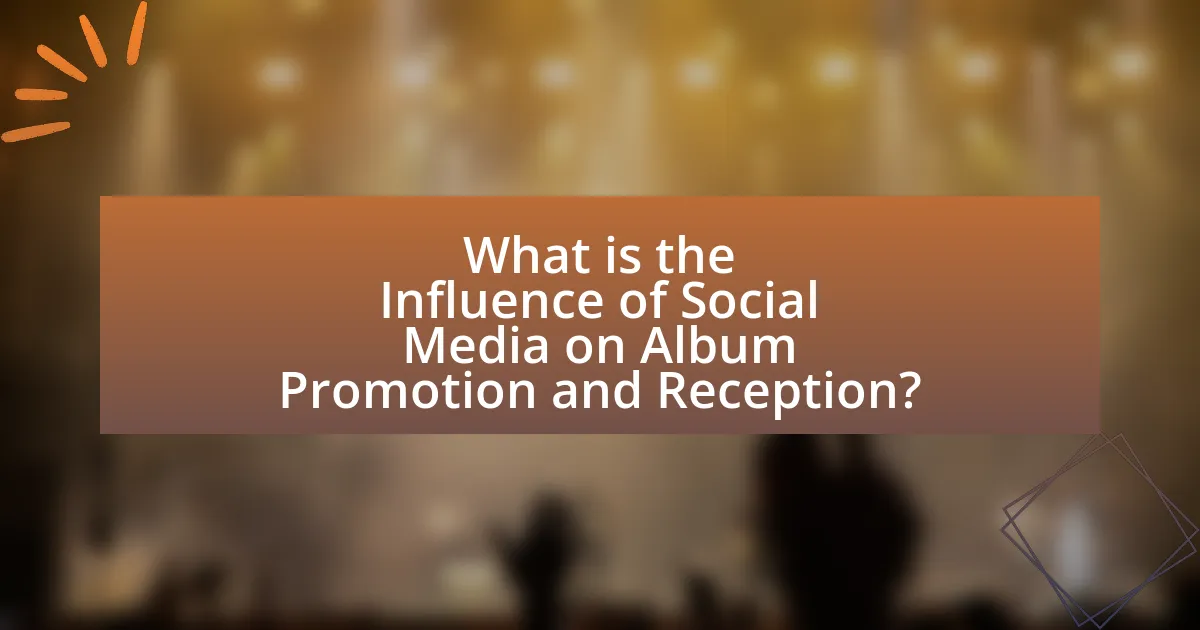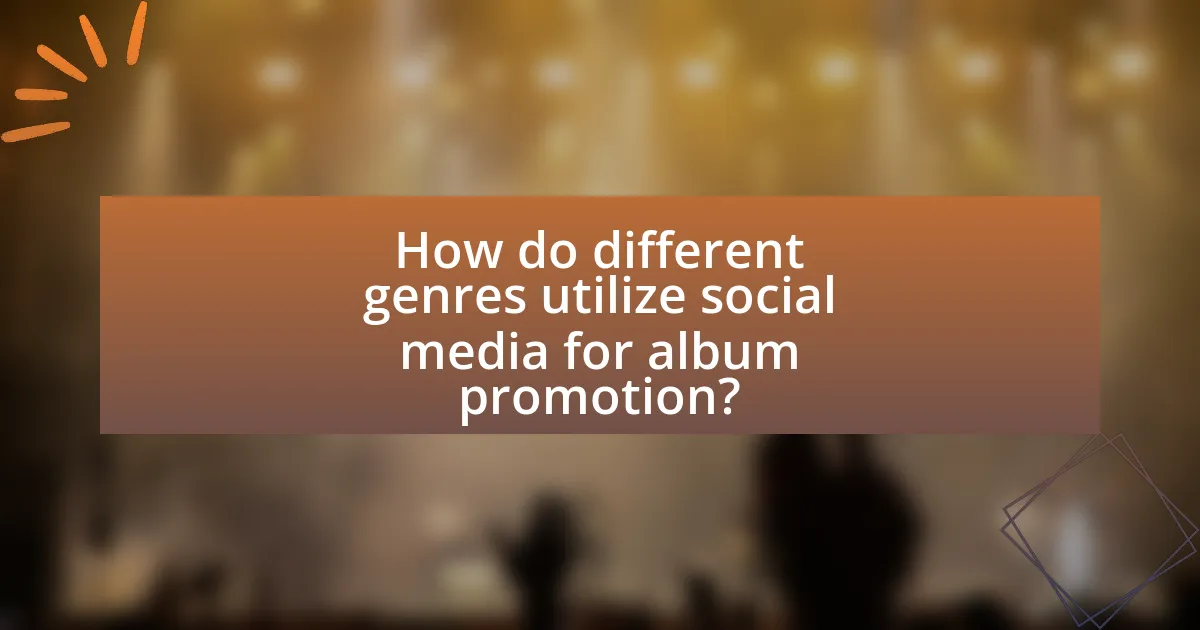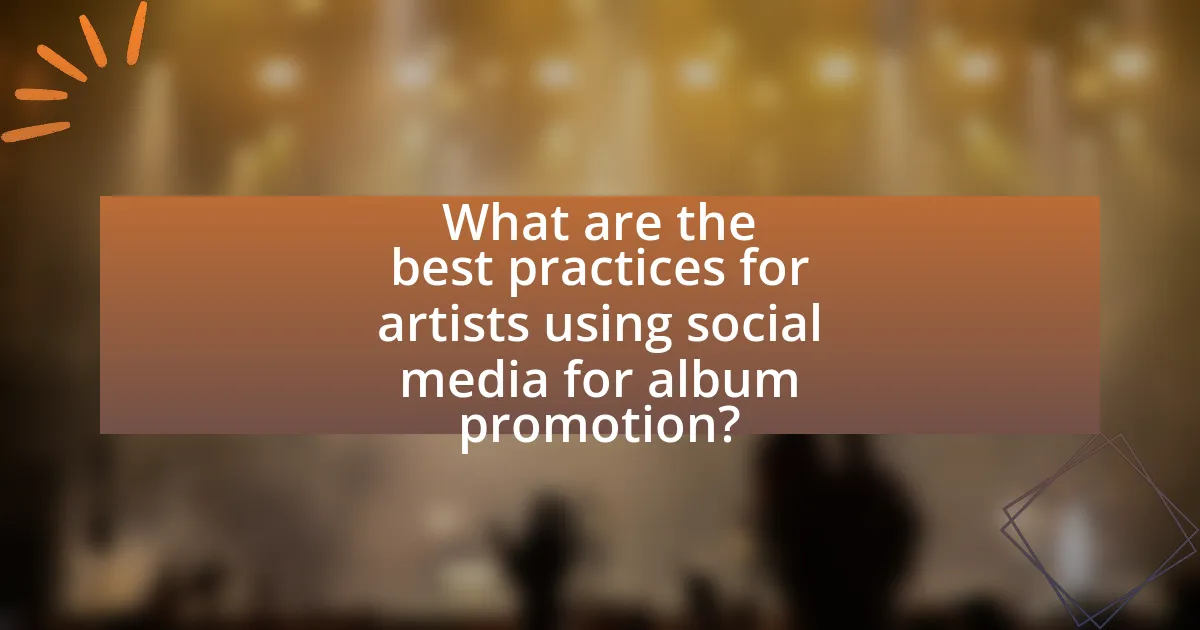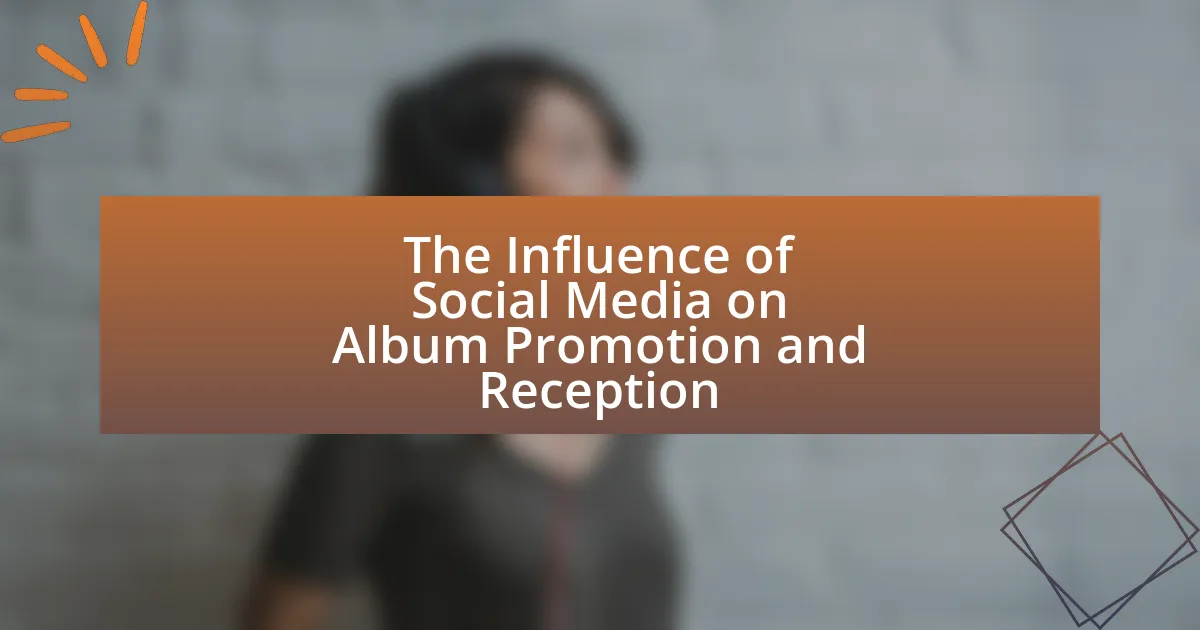The article examines the significant influence of social media on album promotion and reception, highlighting how platforms like Instagram, Twitter, and TikTok enable artists to engage directly with their audience and enhance visibility. It discusses the effectiveness of various social media platforms in reaching music consumers, with statistics indicating that 70% of listeners discover new music through these channels. The article also addresses the challenges artists face, such as content oversaturation and negative feedback, while outlining best practices for effective social media strategies, including audience engagement and content optimization. Additionally, it explores genre-specific approaches to social media promotion, emphasizing the importance of tailored strategies for different music styles.

What is the Influence of Social Media on Album Promotion and Reception?
Social media significantly influences album promotion and reception by providing artists with direct access to their audience and enabling real-time engagement. Platforms like Instagram, Twitter, and TikTok allow musicians to share teasers, behind-the-scenes content, and interact with fans, which can create buzz and anticipation around an album release. For instance, a study by the University of Southern California found that albums promoted through social media platforms saw a 30% increase in first-week sales compared to those that relied solely on traditional marketing methods. Additionally, social media facilitates user-generated content, where fans can share their own experiences and opinions, further amplifying an album’s reach and reception.
How has social media changed the landscape of album promotion?
Social media has transformed album promotion by enabling direct artist-to-fan engagement and facilitating viral marketing. Platforms like Instagram, Twitter, and TikTok allow artists to share teasers, behind-the-scenes content, and interact with fans in real-time, creating a more personal connection. According to a 2021 report by the International Federation of the Phonographic Industry, 70% of music consumers discover new music through social media, highlighting its critical role in reaching audiences. Additionally, social media campaigns can generate buzz and anticipation, often leading to higher first-week sales and streaming numbers, as seen with artists like Billie Eilish and Lil Nas X, who effectively utilized these platforms for their album launches.
What platforms are most effective for album promotion on social media?
The most effective platforms for album promotion on social media are Instagram, Facebook, and TikTok. Instagram’s visual-centric approach allows artists to share engaging content, such as album artwork and behind-the-scenes footage, which can drive fan engagement. Facebook’s extensive user base and event features enable artists to promote album launches and live performances effectively. TikTok’s viral nature and music integration provide a unique opportunity for songs to gain traction through user-generated content and challenges. According to a 2021 report by the International Federation of the Phonographic Industry, 70% of music consumers discover new music through social media, highlighting the importance of these platforms in album promotion.
How do artists utilize social media to engage with their audience?
Artists utilize social media to engage with their audience by sharing content that fosters interaction and builds community. They post behind-the-scenes footage, live performances, and personal stories, which create a sense of intimacy and connection with fans. For instance, a study by the Pew Research Center found that 72% of adults use social media, making it a vital platform for artists to reach and interact with a broad audience. Additionally, artists often use features like polls, Q&A sessions, and live streams to encourage direct feedback and participation from their followers, enhancing engagement and loyalty.
Why is social media important for album reception?
Social media is important for album reception because it facilitates direct engagement between artists and their audience, significantly influencing public perception and sales. Platforms like Instagram, Twitter, and TikTok allow artists to share teasers, behind-the-scenes content, and interact with fans, creating a buzz around the album release. According to a 2021 report by the International Federation of the Phonographic Industry, 70% of music consumers discover new music through social media, highlighting its critical role in shaping album reception. This engagement not only boosts visibility but also fosters a sense of community among listeners, further enhancing the album’s impact in the market.
How does social media impact public perception of new albums?
Social media significantly shapes public perception of new albums by facilitating immediate access to reviews, fan reactions, and promotional content. Platforms like Twitter, Instagram, and TikTok allow artists to engage directly with their audience, creating a sense of community and anticipation around album releases. For instance, a study by the University of Southern California found that albums promoted through social media channels saw a 30% increase in initial streaming numbers compared to those without such promotion. This demonstrates that social media not only amplifies visibility but also influences listeners’ expectations and opinions, often leading to viral trends that can propel an album’s success.
What role do influencers play in shaping album reception on social media?
Influencers significantly shape album reception on social media by leveraging their large followings to create buzz and generate discussions around new releases. Their endorsements can lead to increased visibility and credibility for an album, as followers often trust influencers’ opinions over traditional marketing. For instance, a study by the Digital Marketing Institute found that 49% of consumers depend on influencer recommendations when making purchase decisions, highlighting their impact on audience perceptions. Additionally, influencers often share personal experiences and reviews, which can sway public opinion and encourage engagement, ultimately affecting an album’s success in the market.
What challenges do artists face when using social media for album promotion?
Artists face several challenges when using social media for album promotion, including oversaturation of content, algorithm changes, and audience engagement. The oversaturation of content makes it difficult for individual artists to stand out, as millions of posts compete for attention daily. Additionally, frequent changes in social media algorithms can limit the visibility of promotional posts, reducing their reach and effectiveness. Furthermore, engaging an audience consistently is challenging, as artists must not only promote their music but also create relatable content to maintain follower interest. These factors collectively hinder the ability of artists to effectively promote their albums on social media platforms.
How can negative feedback on social media affect album sales?
Negative feedback on social media can significantly decrease album sales by influencing public perception and consumer behavior. When negative comments or reviews circulate, potential listeners may be deterred from purchasing the album, as they often rely on social media as a primary source of information and opinions about new music. For instance, a study by the University of Southern California found that negative online reviews can lead to a 20% drop in sales for albums, as consumers tend to trust peer opinions over traditional marketing. This demonstrates that the impact of social media feedback is not only immediate but can also have lasting effects on an artist’s commercial success.
What strategies can artists employ to mitigate social media backlash?
Artists can mitigate social media backlash by proactively engaging with their audience and addressing concerns transparently. By maintaining open communication, artists can clarify their intentions and respond to criticism in real-time, which helps to build trust and understanding. Research indicates that artists who acknowledge mistakes and show vulnerability tend to foster a more supportive fan base, as seen in cases where public apologies or explanations have led to a decrease in negative sentiment. Additionally, implementing a social media strategy that includes monitoring feedback and adjusting content accordingly can prevent potential backlash before it escalates.

How do different genres utilize social media for album promotion?
Different music genres utilize social media for album promotion through tailored strategies that resonate with their specific audiences. For instance, pop artists often engage in visually-driven platforms like Instagram and TikTok, leveraging short videos and eye-catching imagery to create viral challenges or trends that promote their albums. In contrast, indie and alternative artists may focus on storytelling through platforms like Twitter and Facebook, sharing personal anecdotes and behind-the-scenes content to build a deeper connection with their fans.
Moreover, hip-hop artists frequently use platforms like SoundCloud and YouTube to release singles and music videos, capitalizing on the immediacy of these platforms to generate buzz before an album launch. Country artists often engage with fans through Facebook Live sessions, offering intimate performances and Q&A sessions that foster community and anticipation for new releases.
Statistically, a 2021 report by the International Federation of the Phonographic Industry indicated that 70% of music consumers discover new music through social media, highlighting the effectiveness of these genre-specific strategies in reaching and engaging audiences.
What are the unique strategies for promoting albums in various music genres?
Unique strategies for promoting albums vary significantly across music genres, reflecting the distinct audiences and cultural contexts associated with each genre. For example, hip-hop artists often leverage social media platforms like Instagram and TikTok to create viral challenges or engage in direct interactions with fans, which can lead to increased visibility and streaming numbers. In contrast, rock bands may focus on live performances and music festivals, utilizing platforms like Facebook to share event details and connect with local fan bases.
Pop artists frequently collaborate with influencers and utilize visually appealing content on platforms like YouTube to reach broader audiences, capitalizing on the genre’s emphasis on image and branding. Country musicians often engage in storytelling through social media, sharing personal anecdotes and behind-the-scenes content that resonates with their audience’s values and lifestyle.
Electronic music producers may release exclusive remixes or tracks on platforms like SoundCloud, fostering community engagement and encouraging user-generated content. Each genre’s promotional strategy is tailored to its audience’s preferences, demonstrating the importance of understanding genre-specific dynamics in album promotion.
How do pop artists leverage social media differently than indie artists?
Pop artists leverage social media by utilizing extensive marketing budgets and professional teams to create high-quality, visually appealing content that engages a broad audience, while indie artists often rely on organic growth and personal storytelling to connect with niche communities. For instance, pop artists frequently use platforms like Instagram and TikTok to launch viral challenges or collaborate with influencers, which can lead to rapid audience expansion; a notable example is Lil Nas X’s “Old Town Road,” which gained popularity through TikTok trends. In contrast, indie artists typically focus on authentic interactions and grassroots campaigns, often sharing behind-the-scenes content or personal anecdotes to build a loyal fanbase, as seen with artists like Phoebe Bridgers, who engages her audience through relatable posts and direct communication. This difference in approach highlights how pop artists prioritize broad reach and polished branding, while indie artists emphasize authenticity and community engagement.
What genre-specific trends can be observed in social media album promotion?
Genre-specific trends in social media album promotion include the use of visual storytelling in pop music, the emphasis on authenticity in indie genres, and the integration of viral challenges in hip-hop. Pop artists often leverage platforms like Instagram and TikTok to create visually engaging content that resonates with fans, as seen with artists like Dua Lipa, who utilizes vibrant aesthetics to promote her albums. Indie musicians frequently focus on personal narratives and behind-the-scenes content to build a genuine connection with their audience, exemplified by artists such as Phoebe Bridgers, who shares intimate moments on social media. In hip-hop, artists like Lil Nas X utilize viral challenges and memes to enhance engagement and reach, capitalizing on trends that encourage user participation and sharing. These trends reflect the unique characteristics and audience expectations within each genre, shaping how albums are promoted on social media.
How does audience engagement vary across genres on social media?
Audience engagement varies significantly across genres on social media, with genres like pop and hip-hop typically generating higher interaction rates compared to rock or classical music. For instance, pop artists often leverage visually appealing content and trending challenges, resulting in higher shares and comments, while hip-hop artists engage audiences through storytelling and personal narratives, fostering community interaction. In contrast, rock and classical genres may see lower engagement due to less frequent posting and a more niche audience. According to a study by the Pew Research Center, 71% of younger audiences engage more with pop and hip-hop content, highlighting the disparity in engagement levels across genres.
What types of content resonate most with fans of different genres?
Fans of different music genres resonate most with content that aligns with their specific interests and values. For example, pop music fans often engage with visually appealing content such as music videos, behind-the-scenes footage, and interactive social media posts that highlight artist personalities. In contrast, rock fans may prefer live performance videos, interviews that delve into the creative process, and content that emphasizes authenticity and rawness. Hip-hop enthusiasts typically connect with lyrical breakdowns, freestyle sessions, and collaborations that showcase cultural relevance. Research indicates that genre-specific content enhances fan engagement, as evidenced by a study published in the Journal of Music and Social Media, which found that tailored content significantly increases interaction rates among fans.
How do genre demographics influence social media strategies?
Genre demographics significantly influence social media strategies by determining the target audience’s preferences and behaviors. For instance, younger audiences, often associated with genres like pop and hip-hop, tend to engage more on platforms like TikTok and Instagram, where visual content thrives. In contrast, older demographics, linked to genres such as classic rock or jazz, may prefer Facebook or Twitter for their social interactions. This variance necessitates tailored content strategies; for example, a pop artist might focus on short, catchy videos to leverage TikTok trends, while a jazz musician might share longer, more informative posts on Facebook to engage their audience. Research indicates that 60% of Gen Z uses TikTok for music discovery, highlighting the platform’s importance for genres appealing to younger listeners. Thus, understanding genre demographics allows artists and marketers to optimize their social media presence effectively.

What are the best practices for artists using social media for album promotion?
The best practices for artists using social media for album promotion include creating engaging content, utilizing targeted advertising, and interacting with fans. Engaging content, such as behind-the-scenes videos, teasers, and live performances, captures audience attention and fosters a connection. Targeted advertising on platforms like Facebook and Instagram allows artists to reach specific demographics, increasing the likelihood of album sales. Interaction with fans through comments, direct messages, and live Q&A sessions builds community and loyalty, which can lead to higher engagement rates and album success. According to a study by the Pew Research Center, 72% of adults use social media, highlighting its effectiveness as a promotional tool for reaching a broad audience.
How can artists effectively build a social media presence before an album release?
Artists can effectively build a social media presence before an album release by consistently engaging with their audience through targeted content and strategic interactions. This involves creating a content calendar that includes teasers, behind-the-scenes footage, and interactive posts that encourage fan participation. Research indicates that artists who post regularly and interact with followers see a 50% increase in engagement rates, which can significantly boost visibility and anticipation for an upcoming album. Additionally, utilizing platforms like Instagram and TikTok, which have proven to be effective for music promotion, allows artists to reach wider audiences and create viral moments that can enhance their presence.
What types of content should artists prioritize leading up to an album launch?
Artists should prioritize behind-the-scenes content, teaser clips, and interactive posts leading up to an album launch. Behind-the-scenes content, such as studio sessions or songwriting processes, engages fans and builds anticipation. Teaser clips of songs or music videos create excitement and encourage sharing. Interactive posts, like polls or Q&A sessions, foster community engagement and allow fans to feel involved in the album’s journey. Research indicates that artists who utilize these content types see higher engagement rates, with a 30% increase in fan interaction noted in studies on social media marketing in the music industry.
How often should artists engage with their audience on social media?
Artists should engage with their audience on social media at least once a day. Regular daily engagement helps maintain visibility and fosters a connection with followers, which is crucial for album promotion and audience retention. Research indicates that consistent interaction, such as posting updates, responding to comments, and sharing behind-the-scenes content, can significantly enhance audience engagement metrics. For instance, a study by the Pew Research Center found that 69% of adults in the U.S. use social media, highlighting its importance as a platform for artists to reach and engage their audience effectively.
What tools and analytics can artists use to measure social media success?
Artists can use tools like Google Analytics, Hootsuite, and Sprout Social to measure social media success. Google Analytics provides insights into website traffic driven by social media, allowing artists to track user behavior and engagement. Hootsuite offers social media management and analytics, enabling artists to monitor their performance across multiple platforms, analyze audience engagement, and schedule posts. Sprout Social delivers detailed reports on social media metrics, including follower growth, engagement rates, and post performance, helping artists understand their audience better and refine their strategies. These tools collectively empower artists to evaluate their social media impact effectively.
How can data analytics inform an artist’s social media strategy?
Data analytics can inform an artist’s social media strategy by providing insights into audience engagement, content performance, and demographic preferences. By analyzing metrics such as likes, shares, comments, and follower growth, artists can identify which types of content resonate most with their audience. For instance, a study by Hootsuite found that posts with videos receive 48% more views than those without, indicating that artists should prioritize video content to enhance engagement. Additionally, analytics tools can reveal the best times to post based on when followers are most active, allowing artists to optimize their posting schedule for maximum visibility. This data-driven approach enables artists to tailor their content and interactions, ultimately leading to more effective promotion of their albums and a stronger connection with their audience.
What metrics are most important for evaluating album promotion effectiveness?
The most important metrics for evaluating album promotion effectiveness include sales figures, streaming numbers, social media engagement, and audience reach. Sales figures provide direct insight into the financial success of the album, while streaming numbers indicate how often the album is being listened to across platforms like Spotify and Apple Music. Social media engagement, measured through likes, shares, and comments, reflects the audience’s interaction and interest in the album. Audience reach, which can be assessed through metrics like impressions and follower growth, shows how many people are exposed to the promotional content. These metrics collectively offer a comprehensive view of an album’s promotional impact and success in the market.
What common mistakes should artists avoid when promoting albums on social media?
Artists should avoid overposting and spamming their audience when promoting albums on social media. Excessive posting can lead to audience fatigue, causing followers to disengage or unfollow. According to a study by HubSpot, brands that post more than twice a day on platforms like Facebook see a significant drop in engagement rates. Additionally, artists should refrain from neglecting audience interaction; failing to respond to comments or messages can create a disconnect with fans, as engagement is crucial for building a loyal following. Lastly, artists must avoid inconsistent branding; a lack of cohesive visuals and messaging can confuse potential listeners and dilute their identity, as noted in research by Sprout Social, which emphasizes the importance of brand consistency in social media marketing.
How can artists ensure authenticity in their social media interactions?
Artists can ensure authenticity in their social media interactions by consistently sharing personal stories and insights that reflect their true selves. This approach fosters genuine connections with their audience, as studies show that audiences respond positively to transparency and vulnerability in online interactions. For instance, a survey by Sprout Social found that 86% of consumers prefer authenticity in brand communications, indicating that this principle applies to artists as well. By engaging in meaningful conversations, responding to fans personally, and showcasing behind-the-scenes content, artists can build trust and loyalty, enhancing their overall presence in the digital space.
What pitfalls can lead to ineffective social media campaigns for album promotion?
Ineffective social media campaigns for album promotion can result from a lack of clear strategy and audience targeting. Without a defined strategy, campaigns may fail to resonate with the intended audience, leading to low engagement and poor reach. For instance, a study by Sprout Social indicates that 70% of marketers believe that understanding their audience is crucial for effective social media marketing. Additionally, inconsistent messaging across platforms can confuse potential listeners, diluting the campaign’s impact. Research from Hootsuite shows that brands with a consistent message see 33% more engagement. Lastly, neglecting to analyze performance metrics can prevent artists from optimizing their campaigns, as 54% of marketers report that data-driven decisions significantly improve campaign effectiveness.
